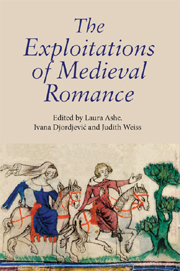Book contents
- Frontmatter
- Contents
- Preface
- Notes on Contributors
- Abbreviations and Editorial Note
- Introduction
- 1 The Fairies in the Fountain: Promiscuous Liaisons
- 2 Saracens and Other Saxons: Using, Misusing, and Confusing Names in Gui de Warewic and Guy of Warwick
- 3 The Exploitation of Ideas of Pilgrimage and Sainthood in Gui de Warewic
- 4 Chanson de geste as Romance in England
- 5 Patterns of Availability and Demand in Middle English Translations de romanz
- 6 Reading a Christian–Saracen Debate in Fifteenth-Century Middle English Charlemagne Romance: The Case of Turpines Story
- 7 Subtle Crafts: Magic and Exploitation in Medieval English Romance
- 8 Meeting Grounds: Gardens in Middle English Romance
- 9 ‘Als for the worthynes of þe romance’: Exploitation of Genre in the Buik of Kyng Alexander the Conquerour
- 10 Sir Gawain and the Green Knight and the Limits of Chivalry
- Index of Manuscripts
- General Index
9 - ‘Als for the worthynes of þe romance’: Exploitation of Genre in the Buik of Kyng Alexander the Conquerour
Published online by Cambridge University Press: 12 September 2012
- Frontmatter
- Contents
- Preface
- Notes on Contributors
- Abbreviations and Editorial Note
- Introduction
- 1 The Fairies in the Fountain: Promiscuous Liaisons
- 2 Saracens and Other Saxons: Using, Misusing, and Confusing Names in Gui de Warewic and Guy of Warwick
- 3 The Exploitation of Ideas of Pilgrimage and Sainthood in Gui de Warewic
- 4 Chanson de geste as Romance in England
- 5 Patterns of Availability and Demand in Middle English Translations de romanz
- 6 Reading a Christian–Saracen Debate in Fifteenth-Century Middle English Charlemagne Romance: The Case of Turpines Story
- 7 Subtle Crafts: Magic and Exploitation in Medieval English Romance
- 8 Meeting Grounds: Gardens in Middle English Romance
- 9 ‘Als for the worthynes of þe romance’: Exploitation of Genre in the Buik of Kyng Alexander the Conquerour
- 10 Sir Gawain and the Green Knight and the Limits of Chivalry
- Index of Manuscripts
- General Index
Summary
The Buik of King Alexander the Conqueror is a decasyllabic poem dealing with the adventures of Alexander from conception to death, running to 19,369 lines. Although it describes itself as a ‘translation’ it is based to varying degrees on multiple Alexandriads and a number of other texts, in languages that include French, Latin, and Older Scots. One of its most interesting qualities is the way in which it exploits the romance form to incorporate multiple genre identities, demarcating the phases of Alexander's career. The text thus falls into four sections identifiable in terms of their major generic influences: first, ‘epic’ writing concerned above all with military expertise and tactics, and with the establishment of Alexander's career as a ‘mirror for princes’; second, the conventional courtly romance, and particularly the tropes associated with fin amors; third, the ‘Wonders of the East’ tradition; and fourth, tragedy and ‘fall literature’.
The Buik of King Alexander identifies itself simply as a ‘romanys’ that is concerned with demonstrating ideal conduct for princes via ‘the worthe deidis of men þat war worthie’ (2056). However, the sharp swings in the poem's values, textual preoccupations, settings and even its characterization of Alexander himself suggest that the Buik in fact exploits the genre of ‘romanys’ to include as many different types of writing as possible. All four sections have their precedents in the earlier Alexander romances of the twelfth and thirteenth centuries, and versions of many of these were used by the poet as source material.
- Type
- Chapter
- Information
- The Exploitations of Medieval Romance , pp. 139 - 158Publisher: Boydell & BrewerPrint publication year: 2010



